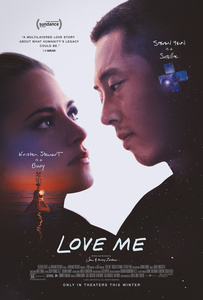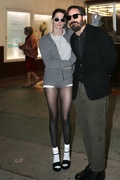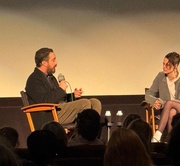Home
- Home
- Team Kristen
- Affiliates
- Wins and Nominations for 'Spencer'
- Cannes Film Festival 2018
- American Ultra
- Anesthesia
- Billy Lynn's Long Halftime Walk
- Cafe Society
- Camp X-Ray
- Certain Women
- Chanel
- Charlie's Angels
- The Chronology of Water
- Crimes of the Future
- Clouds of Sils Maria
- Come Swim
- Equals
- Happiest Season
- JT Leroy
- Lizzie
- Love Lies Bleeding
- Love Me
- Personal Shopper
- Seberg
- Spencer
- Still Alice
- Underwater
- Scheduled Appearances in 2026
Friday, December 27, 2024
'Love Me' Poster
Monday, December 23, 2024
Saturday, December 21, 2024
The editor of 'Sacramento' Max Goldblatt mentions Kristen with Below the Line
Max: Those are the victories as an editor, when you get away with something that an audience would never suspect. I love that stuff.
Aminah: It’s the best. In my last film, I did that by taking a character calling out someone's name, but I'd actually taken the audio from ten scenes earlier, and I put it in, out of shot, and it motivated the character's response so much more. And no one's the wiser.
Max: Right. On the film Sacramento, what I found fascinating about Kristen Stewart is that she is a very impulsive performer, really in the moment and really trying things. She’s giving you a lot of options to work with, and she knows this. I’d seen her performances over the years, but to be suddenly given this gift of her raw footage—how do you construct a Kristen Stewart performance? She might read a line a certain way and it's cool and it works. But then you really like the way she does a line at the end of the scene and, to get that emotional through line, the two don’t necessarily work together.
She's an incredible performer and part of that is her skill and the other part of it is the job of a good editor really honing it in a way that makes most sense for the story. I was really impressed by what she gave us. And I think there's trust there as an actor. They're trusting that the director and editor are gonna put the finished film together in a way that makes them look great.
Aminah: Across your various roles, what would you say is your happiest memory in the world of filmmaking?
Max: I’ll pick a recent one—when we premiered Sacramento at the Tribeca Film Festival. I’d had other films premiere at Tribeca, but with this one, there was a different energy. It was premiering in one of the larger theaters, and there was a red carpet. The screening was sold out, and it's a comedy. We had never shown it to more than two dozen people. So you're sitting there in the theater, the lights go down, and you're wondering if this sold-out audience is going to like this thing that you worked so hard on, or if they’re going to hate it. So, the movie starts. You’re anticipating those first couple laughs, or what you hope is a laugh. And they started rolling in. The house was on fire. They were such a great audience. There were some moments that were shocking or extremely funny, and I got so excited waiting for these moments to hit in this big auditorium.
There’s nothing like that, especially these days when you don’t know if a film is even going to play in theatres or go straight to streaming, or be lost in the shuffle. We’d just been picked up for theatrical distribution the day before. So, to be able to sit in the theater and say, not only is this so amazing, we're in a sold-out theater with people and they're loving the movie, and this is not the only time this will happen—it was just exhilarating for me.
Steven Yeun mentions Kristen and 'Love Me' with GQ Korea
GQ How and why did you get involved in 'LOVE ME'?
Steven Yeun: It’s been so long since I got the script, so I don’t remember exactly. I just remember my manager sending me the script and telling me that Kristen Stewart was going to be in it. I have always admired Kristen Stewart and loved her work. I thought she was so great at expressing herself as an artist. The fact that she was involved was a big factor in my decision, but when I read the script, I also loved how honest and bold and earnest it felt. Ultimately, I thought it was a really lovely film. I also respected the fact that it felt like a piece of work that was confident in itself. So I knew I had to do it.
Thursday, December 19, 2024
Behind the scenes photos on the set of 'Love Me'
Sunday, December 8, 2024
Kristen moderates a 'Maria' Q&A with Pablo Larrain in LA - 7 December 2024
HQ
Fan Photos
Click on photos for full view.
Death is not something Chilean filmmaker Pablo Larraín is afraid of. From “Jackie” to “El Conde” and now with his latest feature, “Maria,” Larraín has often explored the effect mortality has on individuals, especially on those with the ability to make an impact on others, never shying away from the mysteries the subject offers, but instead creating heart-rending, often celebratory studies of how certain figures, against all odds, find meaning in their lives. In reference to his loose “Important Women” trilogy, consisting of “Jackie,” “Spencer,” and “Maria,” Larraín sets his lens on three iconoclasts who became icons in their own right, each forced to face death as a result of the structures they inhabited.
Reuniting with his “Spencer” star Kristen Stewart recently for a Q&A following a screening of “Maria” at the American Cinematheque’s Aero Theatre in Santa Monica, Larraín shared what drew him to opera singer Maria Callas in the first place and how her narrative connects to both Jacqueline Kennedy and Diana Spencer, but also stands apart.
Death is not something Chilean filmmaker Pablo Larraín is afraid of. From “Jackie” to “El Conde” and now with his latest feature, “Maria,” Larraín has often explored the effect mortality has on individuals, especially on those with the ability to make an impact on others, never shying away from the mysteries the subject offers, but instead creating heart-rending, often celebratory studies of how certain figures, against all odds, find meaning in their lives. In reference to his loose “Important Women” trilogy, consisting of “Jackie,” “Spencer,” and “Maria,” Larraín sets his lens on three iconoclasts who became icons in their own right, each forced to face death as a result of the structures they inhabited.
Reuniting with his “Spencer” star Kristen Stewart recently for a Q&A following a screening of “Maria” at the American Cinematheque’s Aero Theatre in Santa Monica, Larraín shared what drew him to opera singer Maria Callas in the first place and how her narrative connects to both Jacqueline Kennedy and Diana Spencer, but also stands apart.
“I think Maria Caras was someone that as she was singing she was dying every time. Life was taken from her while she sang and I wondered if that was filmable. Can we shoot that? Can we film that and put it in a movie?” said Larraín. “Can we not only feel her perception through music, but really try to understand that Maria Callas sang eight operas more than 50 times in her life and seven of them were tragedies, so she, the main character, was death. Death was dead in the last scene. So I think she became the sum of the tragedies that she played on stage. So it was someone that circulated tragedy and and we didn’t want to avoid that. We wanted to get into that tragedy and that tragic figure and make a celebration out of it and deal with that and not hide from it.”
Larraín extended a great deal of credit to his star Angelina Jolie for capturing this tragedy and opening herself to “the idea of dying.” Stewart agreed, but felt the music also really helped connect her even when she didn’t always understand it.
Death is not something Chilean filmmaker Pablo Larraín is afraid of. From “Jackie” to “El Conde” and now with his latest feature, “Maria,” Larraín has often explored the effect mortality has on individuals, especially on those with the ability to make an impact on others, never shying away from the mysteries the subject offers, but instead creating heart-rending, often celebratory studies of how certain figures, against all odds, find meaning in their lives. In reference to his loose “Important Women” trilogy, consisting of “Jackie,” “Spencer,” and “Maria,” Larraín sets his lens on three iconoclasts who became icons in their own right, each forced to face death as a result of the structures they inhabited.
Reuniting with his “Spencer” star Kristen Stewart recently for a Q&A following a screening of “Maria” at the American Cinematheque’s Aero Theatre in Santa Monica, Larraín shared what drew him to opera singer Maria Callas in the first place and how her narrative connects to both Jacqueline Kennedy and Diana Spencer, but also stands apart.
“I think Maria Caras was someone that as she was singing she was dying every time. Life was taken from her while she sang and I wondered if that was filmable. Can we shoot that? Can we film that and put it in a movie?” said Larraín. “Can we not only feel her perception through music, but really try to understand that Maria Callas sang eight operas more than 50 times in her life and seven of them were tragedies, so she, the main character, was death. Death was dead in the last scene. So I think she became the sum of the tragedies that she played on stage. So it was someone that circulated tragedy and and we didn’t want to avoid that. We wanted to get into that tragedy and that tragic figure and make a celebration out of it and deal with that and not hide from it.”
Larraín extended a great deal of credit to his star Angelina Jolie for capturing this tragedy and opening herself to “the idea of dying.” Stewart agreed, but felt the music also really helped connect her even when she didn’t always understand it.
“There is ambiguity in the sound of music and in the performance of opera that can cut sharper and quicker than dialogue and plot, I mean it just like permeates,” Stewart said. “There’s something about voiceless articulation that can drop you and you could speak any language, you could speak Spanish, Italian. This movie feels like it endeavors to be an opera and I don’t speak Italian and I’m not an opera aficionado by any means and so like I think that that doesn’t mean that you’re alienated by the form of it and it’s really cool to make a movie for like a normal audience that still endeavors to touch you in that particular way.”
Comparing this effect to “Spencer,” Larraín explained that it had everything to do with how he approaches narrative as something that should be perceived and not necessarily spoon-fed to audiences.
"I think there’s a big limitation in the more rational approach to movies,” he said, “where there’s like a shot and there’s like a shot and there’s like a two shot and there’s like a shot from here, so we know that you’re here, and like a logical narrative of the situation, but I feel that reality is way more complicated.”
Appreciating this sentiment, Stewart added, “It’s so easy to forget that you’re allowed to interact. Sometimes I’m like, I don’t know, hard on myself — well no sometimes I’m like, ‘Well, you’re an idiot.’ You watch the thing and touch it instead of immediately going, ‘What is this about?’ It’s like audiences are the worst. And we’re all the same, it’s just the worst is when you’re always trying to fucking crack the code and just get ahead of the game and you’re like, ‘Why am I trying to race through something that’s being a gift to me?'”
In a way, Stewart felt the strongest impact “Maria” makes and how it stands apart from “Jackie” and “Spencer” is in how it captures artistry and particularly Larrain’s sensibilities as an artist.
'"Maria’ is your first film about an artist in a literal sense, even though I find artistry in Jackie and Diana, the way they inhabited the world,” said Stewart. “Maria literally dies when the art goes and you literally told me yourself no creativity is death and I fully cried watching this movie when she takes her last breaths, not because I know Maria Callas, but because I know you.”
Closing out their chat, Larraín informed Stewart that she would be getting a call soon apropos their next collaboration and that he looked forward to working with her again. He wasn’t exactly sure of the details, but when it comes to art, sometimes the only thing that can get in your way is death itself.
































































































